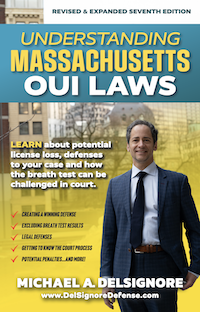Leaving the Scene of Personal Injury in Massachusetts
If you have been charged with leaving the scene of personal injury it is important to understand the charge, the possible penalties and your possible defenses.
To prove someone guilty of Leaving the scene of personal injury in Massachusetts, the prosecutor must show that:
- The defendant operated a vehicle
- On a public way (any roadway that the public has access to)
- That the defendant collided with or otherwise injured another person
- That the defendant knew they collided with the other person
- That after the collision or injury the defendant did not stop and and make known their name, home address, and the registration number of the vehicle M.G.L. Chapter 90, Section 24(2) (a1/2)(1)
The extent of the injury is not relevant except to show whether or not the defendant was aware a collision occurred. In other words, the severity of the injuries or lack of severity cannot be used to show guilt. However, if the injuries are very serious it can be used to show that it is in fact likely that the defendant knew the accident occurred. If the injuries are comparatively minor, a defense attorney may be able to argue that the defendant was not aware a collision ever occurred.
Attorney DelSignore explains how to defend a leaving the scene of personal injury charge in court
This rule, however, has some exceptions to it. Often times, when there are two or more parties involved in an accident, the operator of the vehicle which caused the collision may be hurt. If this is the case, the obligation the driver has to identify him or herself is obviously not of top priority. The person is obligated, however, to provide identifying information in a timely manner after the accident occurs.
The Massachusetts Appeals Court has ruled that juries should be allowed to consider whether the time it took for a person to identify him or herself is considered reasonable
What are the Penalties of Leaving the Scene of Personal Injury?Under the statute, the maximum penalty is two years in jail and a $1,000 fine. The statute also imposes a mandatory minimum of six months in jail, $500 fine and a one-year license loss.
The penalty for leaving the scene of personal injury where a death occurred is a minimum two-and-a-half-year state prison sentence, with the maximum sentence being ten years behind bars. The fines range from $1,000.00-$5,000.00.
The statute does not allow for a continuance without a finding even on a first offense. This means that if you were to accept a plea on the charge you would have to plead guilty
The registry has the right to revoke your license for one year if you were involved in a personal injury matter (that did not result in the death of a person) in which you left the scene. A second offense constitutes a two-year license revocation.
If you left the scene in which a death occurred, you can expect your license to be revoked for three years automatically. A second offense will result in the loss of your license for ten years.
. . . . . .
Note: The RMV does not have the authority to grant a hardship license on a guilty finding for leaving the scene of personal injury. However, you may be able to appeal the suspension the Board of Appeals. You will need to show that you have an otherwise good driving history and a genuine need for your license.
The answer to this question is yes. The prosecutor must prove all five elements of the charge beyond a reasonable doubt; that you were driving on a public roadway, that you were involved in a collision and that you knew and fully understood that you were involved with the said collision, that there were injuries to other persons as a result of the collision, and that you left the scene without providing your identity and personal information.
An experienced defense attorney will be able to help you win your case in court. Although each case is difference, your defense attorney may use arguments such as;
- You were not aware you were involved in a collision, especially if the collision and resulting injuries were comparatively minor
- That you were not traveling on a public way but instead on private property
- That you were not the one behind the wheel of the vehicle at the time of the collision
** This is not an exhaustive list of all possible defenses available. Your attorney will be able to review your case and discuss with you the best possible defenses to present.
What to Do NextIf you have been charged with leaving the scene of personal injury you are facing a mandatory minimum jail sentence. It is critical for you to discuss your case with an attorney who has a history of successfully representing clients.
The attorneys at DelSignore law are experienced in driving offenses and can be reached directly at 781-686-5924 to discuss your case.
Often those charged with Leaving the Scene of property damage face a negligent operation charge as the crime involves a car accident. If you are in this predicament, read more about negligent operation and driving recklessly in Massachusetts here.
Similarly, you may face an OUI charge if the arresting officers concludes that the accident was a result of you drinking and driving. If this is the case, you should consider hiring an experienced OUI attorney who also handles personal injury cases. Feel free to read more about our OUI case results here.
 Massachusetts DUI Lawyer DelSignore Law Home
Massachusetts DUI Lawyer DelSignore Law Home
